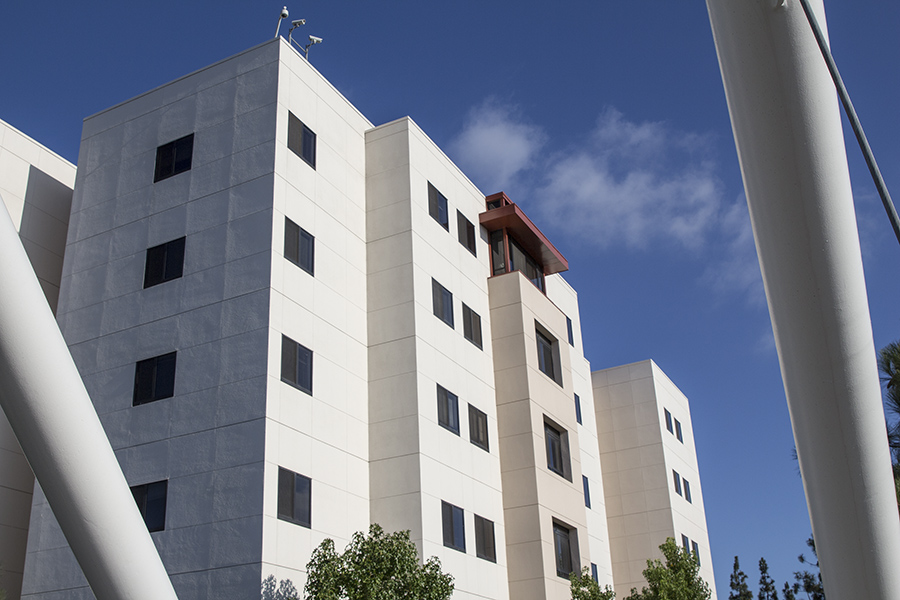San Diego State is invoking a new housing policy for incoming freshmen, requiring first year students to live on campus for two years.
The university’s Sophomore Success Initiative includes two phases. For fall 2017, incoming freshmen who are out-of-state or international students, student athletes, Guardian Scholars, members of the Honors College or enrolled in the School of Nursing will be required to live on campus for their second year beginning fall 2018.
All second-year, non-local students must live on campus beginning fall 2019.
This new housing policy, taking effect in fall 2019, comes at the same time as the California State University’s decision to make remedial mathematics and English courses credit bearing. Both new policies are being implemented to help increase four year graduation rates.
The Housing Administration & Residential Education Office is supporting the policy based on “success data for freshmen and sophomores living on campus,” SDSU marketing coordinator Hannah Bowen said in an email.
Despite the data, SDSU’s new housing policy has been met with mixed reviews from current students.
“Two years is too much,” said Bryan Copeland, a sophomore and former on-campus resident. “Living on campus was a wonderful experience, but I couldn’t imagine doing it for two years in a row.”
For others, two years on campus is livable, but restricting.
“If I could choose who I wanted to live with and didn’t have to check people in and out – or really have RAs – I wouldn’t mind it,” said Mary Sullivan, a junior and former on-campus resident. “Plus I wish I had a meal plan for two years.”
In preparation for the additional students required to live on campus, SDSU will begin constructing more student housing. The latest addition to SDSU’s student housing, South Campus Plaza, was debuted in the spring 2017 semester and is capable of housing approximately 900 students, according to Bowen.
Construction on a new student residence hall will begin in the fall of 2017, housing approximately 800 students, Bowen said.
To meet system wide California State University requirements, SDSU accepts the top third of applicants in their specific major, despite being an impacted campus.
“We are expecting [about] 5,400 new freshmen on campus when classes begin Aug. 28,” said Matthew Hebert, SDSU’s director of student recruitment and school relations. “It is slightly up just a few percentage points from how many freshmen we had expected this time last year in 2016.”
This student housing policy is just one of the ways SDSU is attempting to increase the graduation rates of incoming freshmen.
In early August, Timothy White, the chancellor of the CSU system, implemented Executive Order 1110, changing the way universities handle college-readiness preparation placement for incoming freshmen.
Following this executive order, SDSU is removing English and mathematics placement exams for incoming freshmen, instead allowing students to show their college readiness through the SAT, the ACT or AP testing, according to Esther Rodriguez, an SDSU admissions counselor.
Remedial English and mathematics courses are required for those who do not show college readiness, but effective fall 2018, all remedial courses throughout the CSU system will become credit-bearing, and will be offered concurrently with a general education credit-bearing course. In previous years, remedial classes did not always carry college credit, forcing students to spend time and energy on classes they needed to pass in order to advance but would not increase their total amount of credits earned. Changes to the separate Early Start program, which offers remedial classes in the summer prior to a student’s freshman year, will be implemented by fall 2019, though universities may offer “pilot” credit-bearing classes before that.
And in fact, SDSU does not have much catching up to do on remedial courses, according to Shaun Harvey, an SDSU admissions counselor and point of contact for Early Start.
Summer early start courses — which at SDSU are offered to students who were accepted to another CSU but live in the San Diego area — already carry one unit, Harvey said.
And for students who are admitted to SDSU and need remediation in English or Math, Harvey said the university already offers three-unit remedial courses the FAST program – which stands for “Freshman Academic Success Track.”
“There’s a couple differences as far as cost and time of completion, but as far as the big picture, the SDSU FAST program is actually what the CSU system is kind of moving towards, because they’re moving the current one unit early start course to try to make it a two unit or three unit credit-bearing course,” Harvey said.
One difference, though, is that while the current FAST program allows students to take both a math and an English remedial course — if they need both — during the summer before their freshman year, the executive order mandates that students may only take one such course over the summer.
“So if a student needs math and English, they take one over the summer and then they would take the alternate course in the fall their first semester,” Harvey said.
Rodriguez said the point of the changes is to give incoming freshmen as much of a chance as possible to graduate on time.
Credit bearing remedial classes is one way the university hopes to accomplish this. Additionally, Rodriguez said SDSU’s Office of Admissions is helping students become “self-advocates” by connecting students with the right resources.
“Once we accept students, we ask ourselves: ‘how will we be strategic so students graduate in four years?’” she said.
Still, to Rodriguez, a student’s success is up to no one but the student.
“It comes down to whether they follow through on the little things that they may not know about unless the correct resources are reached,” Rodriguez said.
This story was updated at 12:15 p.m. on Aug. 29 to more clearly reflect the changes being made to on-campus housing and remedial classes.







